#magic system
Explore tagged Tumblr posts
Text
I present the wheel of magic worldbuilding headcanons.
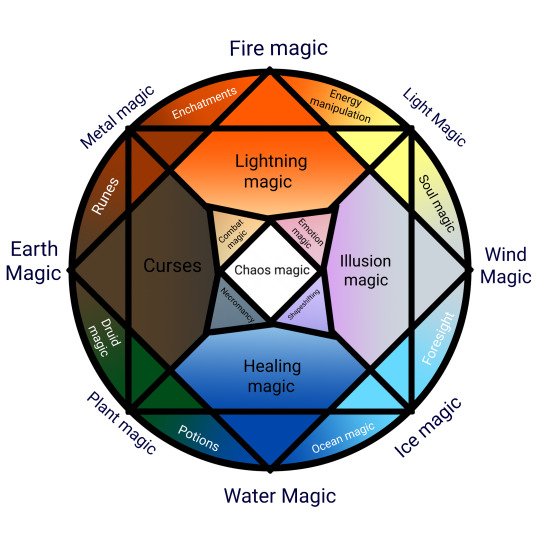
158 notes
·
View notes
Text
When I was in my teens, I used to make an entire magic system with 360+ unique spells, ordered in magic schools and categories, and it boggles my mind that I basically reinvented DnD mechanics, even down to metamagic.
I wanted to make a wiki about it but I don't have time for it.

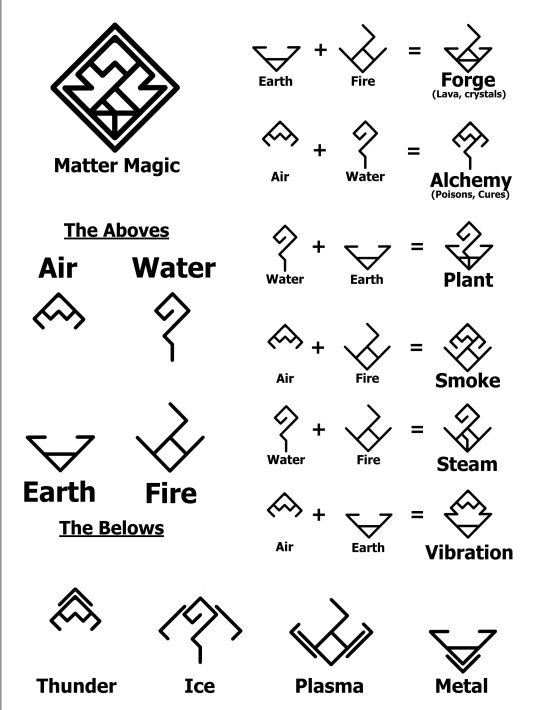
The point was to try to encompass every "superpower" I could think of into a magic system.
I even got lore related to it all, I'm pretty sure I'm gonna simply reuse it all for OC worldbuilding. Ngl the fun part was naming all the spells, symbols and coming up with the logic of it all.
27K notes
·
View notes
Text
Ways to solve the Why Can’t They Use Magic To Fix Everything problem:
•Magic has a cost. The more powerful the spell, the more it drains the caster’s life.
•’We tried that ages ago.The gods grew angry at our arrogance and stripped most of our powers away.’
•Magic is tied to the stars and planets. Its full potential can only manifest on certain astrological events.(And these are once-in-a-millennia type events)
•Only one will a pure heart and selfless intentions can use their full power.
•All magic users are descendants of a (god/spirit). As the years have gone by, the blood has become more diluted, and magic has grown weaker as a result.
•Spell casters can only cast (finite number of spells). They end up using their gift on trivial matters.
•’After the war, we realized the dangers that magic presented. And so we sealed it away, lest it destroy the world.’
•Everyone has magic. Trying to solve one problem is futile as it can be easily undone(often violently and with much destruction)
•inverse of the above: everyone has magic, but their powers are limited and (mostly) harmless.
•Individual, company, or nation has a monopoly on the only substance that can negate magic. As they rule the world, they have installed anti-magic devices everywhere.
•Individual, group, company, or nation has a monopoly on magic. To insure their grip on power, all magic users that do not submit to them are killed.
•An act of good will spawn one of evil. The use of fire will cause somewhere to grow cold and dark. And to save a life, one must sacrifice another.
•The only magic people have access to is Chaos Magic. No one uses it, for obvious reasons.
—••• •• ——• ——• • ••• —•• •• —•—• —•— ••— •••
#writing#creative writing#writing inspiration#writing problems#writing resources#writer#writers#writers and poets#magic#magic system#writer on tumblr#writeblr
6K notes
·
View notes
Text
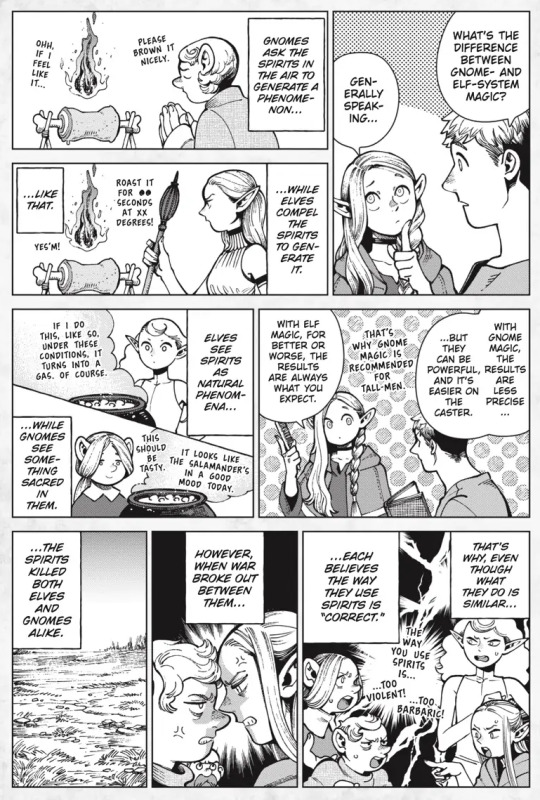
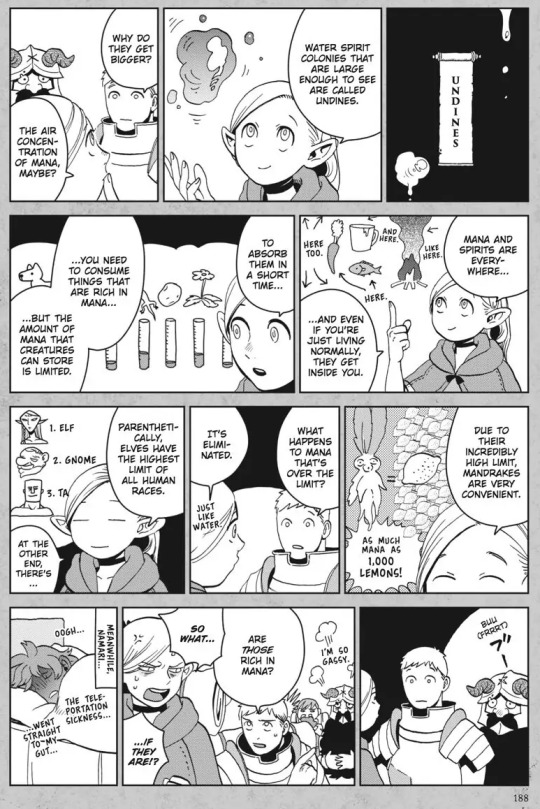
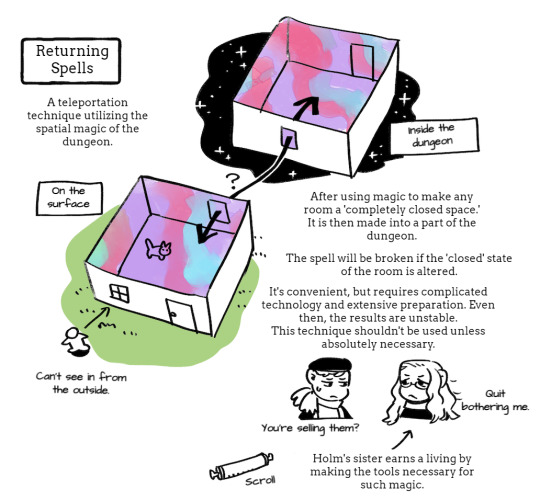
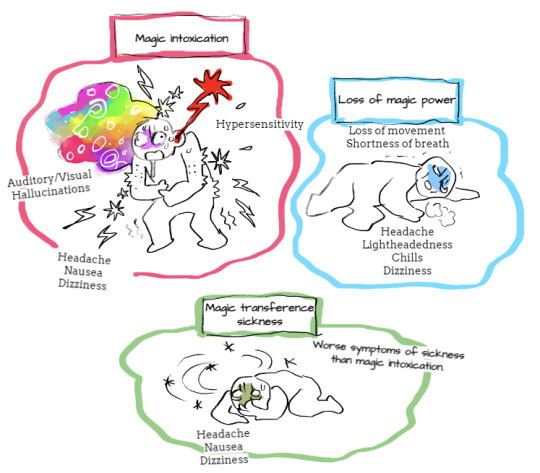
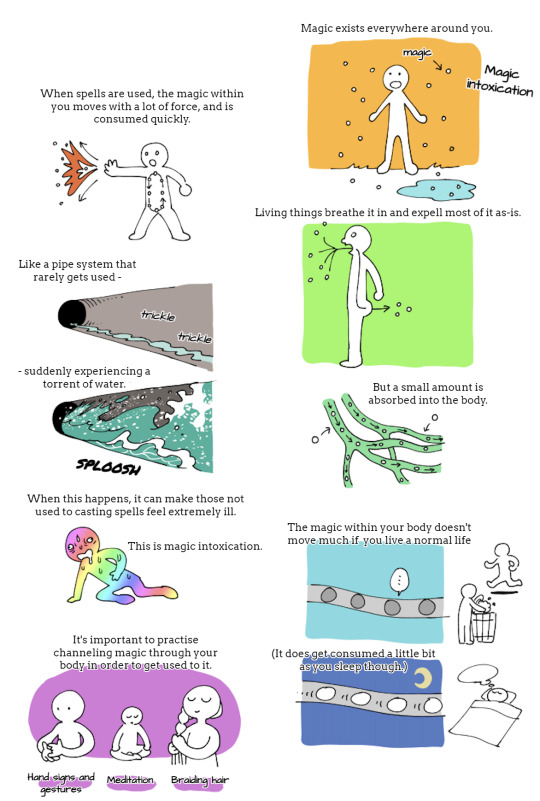
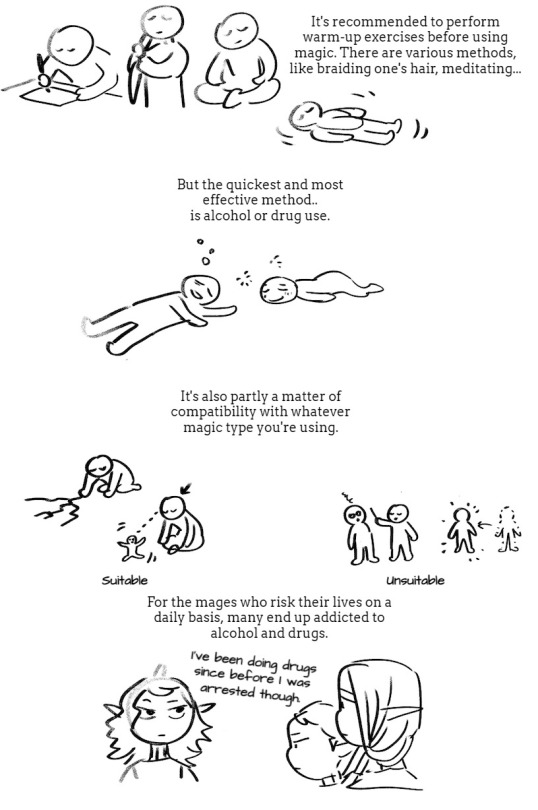
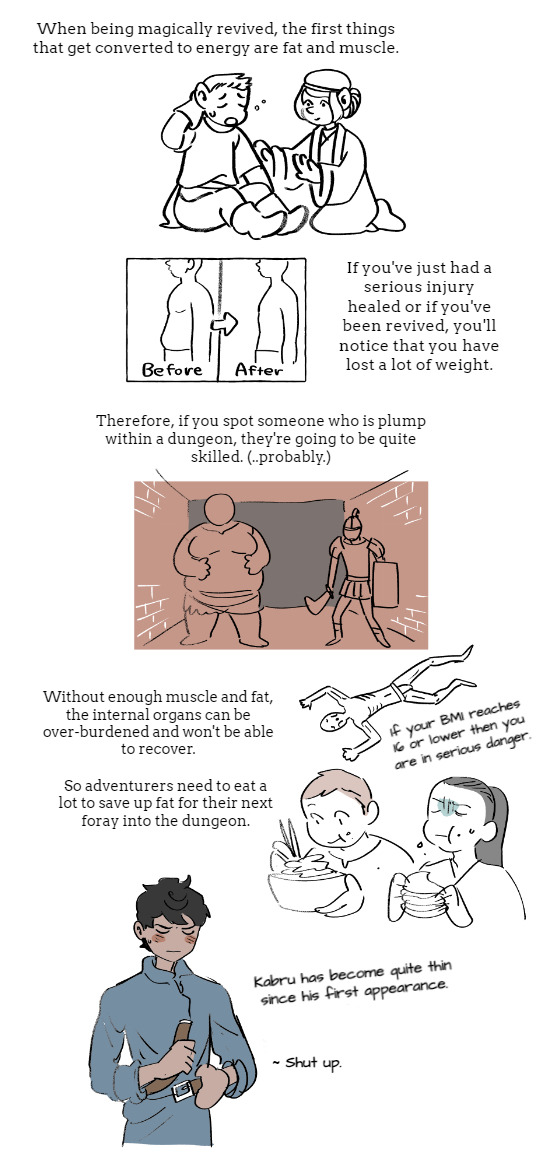
Dungeon Meshi Magic System - Bits about Magic
#dungeon meshi#magic system#for referencing#Compilation#Marcille Donato#Fleki#Kabru of Utaya#Ressurection magic#Mana#returning spell#Theres way more than this but I wanna gather more stuff before making a new post
10K notes
·
View notes
Text
“Ew FairyTail power of friendship”
If the IN UNIVERSE POWER SYSTEM dictates that MAGIC is FEULED BY LOVE then would the power of friendship not OBVIOUSLY MAKE SENSE?????
#fairytail#the power of friendship#magic system#it makes sense if you actually think about it#so use that brain
2 notes
·
View notes
Text
Worldbuilding and Magic Systems: Things to Consider
Have a magic system in mind for your fantasy world? Here's a list of things to consider to help you tie this system into the rest of your worldbuilding, so that it feels more believable and realistic.
Source
What is the source of magic? Is it natural or man-made? Can humans use magic or is it a force of nature that only animals or other races can use?
Does magic originate from inside a person or does it require external items to use? If it comes from items, can the items be made? How long does it take to make the items?
Does the magic cost anything- money, stamina, health, etc.?
Can a person be cut off from being able to use magic? If so, how?
Prevalence
How common is magic in your world? Is it so common that everyone has seen it or is it a subject of myths and rumors?
How long have the people in your world known about magic? Has it always been there or is it a new discovery?
How much does the average person know about magic? How much do experts know? What do people not understand about this magic? Are there any common misconceptions? Myths?
Is magic revered or feared? Or if it's common, is it taken for granted? Are there any taboos surrounding magic?
How many types of magic are there? Are some more common than others?
Are there dedicated schools of thought surrounding the study of magic? Is it taught about in schools? If so, is it taught to children or only at the college (or equivalent) level?
Accessibility
Who can use magic? Who can't? Is it something that only the rich and powerful can use? Why? Or do genetics determine who can use it? Wealth?
Are there any physical limitations that might restrict who can use magic? For instance, maybe old or sickly people can't use magic because it requires a lot of physical effort. Does your society provide accommodations for people who can't use magic? Is a lack of magic ability considered a disability?
Does education level determine capacity for magic?
How easy is it to gain access to magic? How easy is it to learn about magic?
Power/Usefulness
How powerful or useful is magic for different parts of society? Military? Medicine? Entertainment? Art? Childcare? Government? Communication? Business?
How does magic affect the politics of your world? How does it shape the economy? Are there feuds over the use of magic? Do powerful groups in your world have an incentive to limit the use and accessibility of magic? Why?
What happens when people no longer have access to magic? Does this cripple their ability to go through their daily lives? How?
Mix, match, and cross-reference these with other elements of your worldbuilding to form a believable magic system that lives and breaths just as the rest of your world does. For every answer you give to the questions above, consider and build upon the implications of what that might mean for your world. A worldbuilder's best skill is the ability to ask "How will this affect ___?" So make sure you're always considering the ripple effects of each element you add to your world.
Happy worldbuilding y'all!
#creative writing#writing#writers on tumblr#writerscommunity#writing advice#writeblr#writing tips#fiction writing#writing help#fantasy worldbuilding#worldbuilding#fantasy writing#fantasy writer#fantasy novel#fantasy#magic#magic system
1K notes
·
View notes
Text
Could one way of explaining this hypothetical magic system be that each culture relies on a fundamentally different power for its magic, and therefore the ways it interacts with the physical world are so different that what constitutes the primordial elements differs between magic practices, and why contact between magic causes things to go haywire.
Fantasy setting with magic neatly organised into elemental spheres, except each magic-using culture disagrees with all the others about what the primordial elements are, what their associations and correspondences are, and even how many of them there are. Spells always interact with other spells from the same magic system as though its elemental theory is complete, consistent, and correct, but when spells from two different magic systems come into contact it all goes a bit sideways, often in ways that require flowcharts to explain. Like, you think Ground Type vs. Rock Type is bad? There are five separate, mutually exclusive spheres of magic all called "Fire". The Sylvan Confederacy's "Water" magic explodes on contact with the Empire of the Five Pillars' "Water" magic and nobody knows why.
#magic#magic system#i've had this idea for a while to explain having substantially different magic systems coexisting in a story
4K notes
·
View notes
Text
I'm bored of elemental giants. Use environmental giants instead.
Environmental Giants all start out the same, but their bodies take up the features of the place they live in. They become a reflection of their domain.
Giant takes up residence in the cliffs of dover? Not a stone giant. No, that's specifically The Giant of Dover. Its body is made of chalk. It can create dust clouds of chalk with its breath, its shoulders are padded with tufts of short grasses and blackberry bushes.
Giant takes up residence in the ruins of a highway during an apocalypse? That's the I-95 Giant. It has rebar spines along its back, skin of pavement and concrete, and wears wrecked cars as armor.
And to make this idea more dynamic, the giant's form changes as the ecosystem changes. A river gets diverted away from a Giant's domain? Then the Giant dries up along with its land. Now the Giant has an incentive to protect its dominion, and a weakness that its enemies can exploit.
#game design#indie rpg#ttrpg#indie games#rpg#rpgs#indie ttrpg#dnd#tabletop rpgs#worldbuilding#writing#magic system
2K notes
·
View notes
Text
Questions to ask yourself when creating a magic system
I have more questions for you!!! :D
As there are no real-word examples for this one, I’m going to be talking a lot about my own magic systems, and those of the medias I enjoy! There will be a list of all the things I referenced at the bottom!
What does magic DO
Exactly the title. What does magic do? (Can it make potions? Cast spells? Animate things? Transfigure things? Create things? Kill things? Cast hexes or charms? Multiple of these?)
What does magic have an affect on? What does it not?
How strong is magic? What are its limits? How do these differ from person to person, or place to place?
Does magic do different things for different people?
How does a magic caster’s intention for a ‘spell’ affect it? Is magic entirely reliant on a mental image of what is wanted, or does it need to be casted a certain way to work, like a recipe?
How is magic casted? (Note- I recommend being creative here! It doesn’t have to just be waving a wand. It can be through making pottery, it can be through sewing certain patterns, or dancing a certain dance, etc etc etc)
How can spells be used for something that is not their intended/common purpose? How are new uses of magic discovered? Which uses are most common, and why?
How does societal standards affect the use of magic? Will less people know about more harmful or taboo spells? Will it be less common for, say, a woman to use/be trained in magic?
Source of Magic
Where does magic come from? (Do the gods give access to their most devout followers? Is it handed down in one’s blood? Does it come from the earth?)
Is magic learnt, or are people born with it? (E.g does magic work through potions that can be made by anyone with the right ingredients, or is it only possible if one has magic already in their blood?)
Can someone who logically shouldn’t know magic learn/possess it by alternate means? (E.g. Luz from The Owl House learning magic via ‘glyphs’ despite not being a witch) how would people treat this? (Is it seen as ‘lesser’ or somehow not ‘real’ magic?)
Can magic be harnessed through a wand/staff/etc? Can it only function through this conduit, or can it be done without? How does magic function if it does not have the aforementioned conduit? (Is it harder to manage? Is it more dangerous? Is it simply lesser?)
Another dot-point because the last one was far too long; how is the use of ‘magical aides’ (wands, etc) treated? (Is it seen as something only a child would use? Is it very common? Is not using one seen as dangerous and bad?) How does the function of magical aides affect this? (Note- a very good example of this is the string in A Marvellous Light, which functions via ensuring a magicians cradles [hand movements one does to cast a spell] are more precise. It is only used by those with little magic, so it is looked down upon.)
How would one learn magic? (Is magic taught in schools? Are there books on it?)
Can magic be done/enhanced if multiple people cast it together? How would this be done?
Is magic a separate entity from it’s user? Is it an entity at all? Can it react without instruction/ disobey it’s user? Is it a possession of it’s user? Is this different/ perceived differently for different people?
Can magic be mistreated/ abused? (Note- here I do not mean an ‘abuse of power’ I mean abuse in the way one could abuse a pet) what are the consequences of this? (Might magic stop working, or turn on it’s user?)
Affect on Culture/the greater world
Who has magic? Who does not? Who knows about magic? Who does not? Is it a secret? How is this secret kept? Who enforces that it must be a secret? What is the punishment for letting the secret be known?
Can people have more or less magic? Can people have more or less knowledge on it, or skill with it? Does this cause any power imbalances or issues for either side?
How do the uses of magic impact the way things are done? (E.g. if there is a spell used to dry things, people may not use drying racks.) would the skills of those with more magic be useful in a work setting? (E.g. if some people know the aforementioned drying spell and some do not, might those who do know it work as something close to a washerwoman because of their skill?)
Is magic regulated at all? Who regulates it, what are the regulations, how strict are they, and what are the punishments for breaking them?
Is magic seen as normal? (Keep in mind: if magic is possessed by a majority of people, it very well may be. Because of this, characters may be less likely to be impressed by magic. Think about how this will affect the language surrounding magic, and how people treat it.)
How will different people view or interact with magic? (E.g. a rebellious teen, a businessman and an elderly woman are not going to have the exact same view or uses of magic. Try to explore this!)
How will those with a great deal of magic view those without/ without a great amount, and vice versa? How does this affect the world and it’s prejudices?
Consequences
How can magic hurt a person if misused/overused/ used at all? (Is the damage physical, mental, physiological, all three?) (E.g. my own magic system causes people to actively unmake themselves as they use their magic, leading to sickness, insanity, derealisation, hallucinations, etc etc etc)
Is this damage known? How does the knowledge of it affect the treatment of magic? (Are people terrified of it? Do they not care, and see it as a worthy risk? What might lead someone to push through the damage?)
How does this damage manifest, and how noticeable is it? (E.g. Are there physical scars or other warning signs, or is it entirely unnoticeable until it is too late, like magical rabies?)
Can damage from magic be reversed or healed? How? Can potential damage be avoided? How?
Can one’s magic turn on oneself? How would this happen, and what are the consequences of this?
Can magic be hurt/diminished? How does this affect its users? (E.g. silver and werewolves)
When an attempt at magic fails, how does it fail? Is it like baking, where at worst it’ll ‘taste good, but be a little dry’ or is it like mixing volatile chemicals, where at worst you die?
Appearance
How does magic look? (I highly recommend finding a metaphor or motif for magic, as this really helps flesh out its appearance and makes it easier to describe!!)
Can its appearance look different for different people? Can it change over time?
Does magic manifest itself via means other than visual? (One of my characters has very strong nature magic, and thus he grows flowers when he is happy, and always smells floral)
Does magic have a physical effect on it’s users? (E.g. the dark magic in The Dragon Prince)
Is one able to tell when magic has been cast upon something?
Every piece of media I referenced in this, in order of appearance
The Owl House, a TV show on Disney written by Dana Terrace
A Marvellous Light, a novel written by Freya Marske (this series is a wonderful example of how to make a magic system. It is very well thought out, and the varied experiences and views of magic for each magician character is so, so good. 10/10. If you want a good example of magic please read this!!! (Granted I might be a little biased because I just love this book series))
The dragon prince, a TV show on Netflix
208 notes
·
View notes
Text
I really like those analytical moments in battle scenes where a character has their internal monologue wherein they state a definitive rule of the magic/power system that cannot be broken or circumvented under any circumstances and then from that point of logic deduces that the enemy has to be using some kind of strategy or trick within the bounds of the power/magic system's logic, because the alternative is actually impossible.
11 notes
·
View notes
Text
There’s a couple Percy Jackson podcasts that have started covering Rick Riordan’s Egyptian mythology series, the Kane Chronicles, and they’ve all made a well-intentioned but odd analysis of the magic system.
In the Kane Chronicles, a crucial part of the magic system is that the royal families of ancient Egypt practiced magic and hosted gods, and anyone descended from them can do the same thing. These podcast hosts are doing the right thing interrogating a mechanic based on bloodlines, but kinda “missing the forest for the trees” as it were.
These hosts’ takeaway is that the Kanes and people like them can do magic because they are descended from royalty… when it’s REALLY that they can do magic because they are descendants of the first magicians & god-hosts. Riordan just made an ancient Egyptian religious practice, pharaohs being seen as incarnations of gods, literal to build a magic system.
Saying the Kanes “have blood of the pharaohs” is just catchier & than saying they “are descendants of the first magic users and for hosts.” I get the impulse to critique a bloodline-based plot point, but I was puzzled by how much time the podcasters devoted to a problem that doesn’t really exist unless you squint.
12 notes
·
View notes
Text
Overview
All individuals who can be called ‘Adventurers’ are, in fact, some variety of magic user. Even individuals who are considered to be Martial in aspect, rather than Casters, are also magic users. This is because the core of being an ‘Adventurer’ is that your body is imbued with enough magic ability, and your soul likewise saturated, that you can be Resurrected using magic.
Normal people cannot be Resurrected; for most of the people in the world, death is the end, no do-overs. Adventurers, however, have extremely pliant and elastic souls, as well as highly resilient bodies and life energy; this means that, upon death, their soul continues to cling partially to their body, which likewise resists succumbing to injuries, poisons, and illnesses longer than an average person. Magical Resurrections are often performed on the recently dead just in case, but full-on Adventurers are fairly rare.
It is NOT a free ticket, however; each time one is Resurrected, they do lose something. Most often this comes in the form of memories. While often it can be not remembering a segment of your life (upon Resurrection, you no longer remember anything from your adolescent years, for instance), or it can be blank spots in the form of people in your life, up to entire lifespans. Most Adventurers, thus, still avoid death at all costs to avoid being hit with such a heavy penalty. (Note: These memories are not truly ‘lost’, but segments of the soul cannot be retrieved and returned to the body in Resurrection, and thus remain in the afterlife; they are reclaimed upon the Adventurer’s final death)
Once memories are used up (An Adventurer is rendered fully amnesiac upon Resurrection), their body and soul can begin suffering from these effects as well. Resurrection leaving limbs and organs missing, physical senses, and spiritual aspects are uncommon but not unheard of, either as an escalation of memory loss or as the person’s original penalty for Resurrection. Usually if the body and soul are hit immediately, there is something abnormal about the person’s inherent abilities; they may be more inclined towards one particular angle of their powers or another, or highly attuned to certain aspects of their magic. IE; a person may die in an accident and be Resurrected, just to test, and come back blind, but uncover that they are greatly adept in healing and prophetic Divine magics.
The assumed limit for the average Adventurer is approximately five Resurrections.
There are two broad ‘categories’ of magic, each with four specific Branches that denote what can be done with the magic. The categories are the ironically named Inherent Magic (capacity is a natural component of the person who has it based on their lineage), and Bestowed Magic (derived from an external source that either implicitly or explicitly ‘chooses’ a wielder).
Inherent Magics: Rhythmic, Arcane, Psionic, and Tantric Magic.
Bestowed Magics: Nature, Chaotic, Eldritch, and Divine Magic.
From there, each Magic type has four main Classes that resultant users can end up in, based on either a unique ability attuned to each Magic, or broadening skill and capacity in each Branch. In essence, this means that there are three Classes in increasing magical ability per class, starting with a more direct magic-flowing Class that tends more physical, up to a more esoteric mystical caster-adjacent Class. These three are coupled by a unique ability-oriented Class per Branch, characterized by a unique power set that shakes up how the person operates.
Each Branch also has a weakened, more varied pseudo-Class, and a higher-powered Wild Class.
15 notes
·
View notes
Text
Writing Notes: Magic Systems
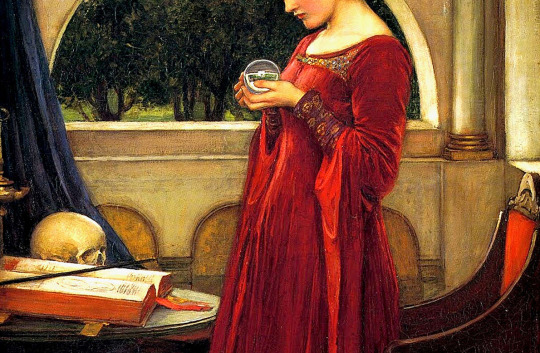
Magic - change wrought through unnatural means
Most fantasy can be placed along a spectrum where there are 3 main points: soft magic at one end, hard magic at the other, and a middle ground between the two.
Soft Magic
Magic that is not well-defined for the reader.
Generally, we don’t understand where the magic comes from, who can use it, or what its limitations are.
Readers can see this type of magic being used.
But they can never anticipate when magic will be used in the plot because they can’t begin to guess how it works.
You can’t break a rule if the rules don’t exist!
Most stories that feature this system will have the magic users be secondary characters, allowing them to avoid explaining exactly how the magic works.
It’s also argued that without knowing everything about the magic, it tends to hold more wonder and excitement for readers.
Hard Magic
Has very rigid boundaries.
Readers know where the magic comes from, how it’s used, who uses it, and what its boundaries and limitations are.
We know the limitations of the characters and can understand why they can’t simply magic themselves out of any particular challenge.
Stories with hard magic systems do not need to avoid the main character being a magic-wielder, as they have the capacity to explain to the reader what is going on.
A lot of writers this system because it gives them very explicit guidelines to follow in their plot and creates some more satisfying pay-offs for readers.
The Middle Ground
The meeting point between the soft and hard systems.
We might understand a bit about the way the magic works, but not all our questions are answered.
While most of the content adheres to rules, these rules aren’t fully explored.
This system relies on the reader’s suspension of disbelief.
The main character can be a magic-wielder or not, and it’s up to the writer to determine when magic will be used in terms of plot.
How to Choose a System
You can and should use these guiding principles to build your magic system. Remember that you don’t have to choose one or the other. Your system can draw from aspects of both. Just stay aware of the weaknesses of the path you choose, and ensure you utilize its strengths.
Use a hard magic system if:
You are going to use magic to solve problems
Your audience is accustomed to the tropes of hard magic
You are okay with jumping through hoops to expand your system
Your magic doesn’t convey a theme
Use a soft magic system if:
You want to convey a theme through magic
You want to create a sense of wonder
You want the ability to expand easily
You want to be accessible to a broader audience
Your magic won’t regularly be used to solve problems
Branches of Magic
Like most writing processes, there isn’t really a correct place to begin designing a magic system. A common, and efficient, place to start, however, is by choosing what type of magic system(s) you wish to employ, such as:
Nature-based magic: water, earth, fire, air, and everything in between
Divination magic: see beyond sight and peer through time and space
Conjuring magic: move objects through space over any distance
Psychic magic: master the world of the mind
Life and death magic: tap into the very forces of life, death, and un-death with this surprisingly versatile collection
Animal- or creature-exclusive magic: some creatures just do it better
Magitech systems: the blurring lines of sorcery and science give magic a next-gen, high-tech flair
Eclectic magic: it doesn’t have to be “real” magic to have a real effect
Uncommon magic systems: the unsung heroes of fantasy magic
AALC Method
How to create your own magic system using the AALC (Appearance, Abilities, Limits & Cost) Method
Appearance
What the magic looks like
Makes the world feel more exotic
Can cause problems for characters but cannot solve them
Usually tied to a character arc
Abilities
What the magic does
Points calculated based on magical effect, range, number of people affected, and duration
Characters have a finite amount of fuel (mana) to use abilities
More powerful abilities require more fuel
The fuel does not have to be overt for the audience to understand
If points not overt, cannot solve conflicts unless a cost system is added
Limits
Unlimited uses of magical abilities
Abilities stratified in codified levels defined by their limits
The more the levels' abilities and limits are known by the audience, the more they can be used to solve conflicts
Focused on clever uses of abilities against stronger foes
Cost system can be added to enhance dramatic moments
Cost
Costs must be greater than or equal to abilities to make them dramatically satisfying
Costs can include time, exhaustion, materials, sanity, morality, etc.
Adds dilemma to magic by forcing characters to make choices
The greater the character's sacrifice, the more audience satisfaction at conflict resolution

Each system builds on the previous ones, so that Cost Systems use all four, while Point Systems only care about Abilities and Appearance.
Multiple systems can exist within the same story, and systems can harden over the course of the story.
The Force, for instance, has been a Soft, Point, Level, and Cost System depending on who wrote it at the time.
SOFT SYSTEMS (Appearance Only)
Window Dressing - magic for secondary characters; can instigate conflict but cannot solve it; e.g., Gandalf
Soft Villain - No explanation or upper limits needed; makes villains more powerful to make heroes greater underdogs; e.g., The Emperor
Chosen One - Unknown power keeps hero safe throughout story; can be considered plot armor unless earned through character arc
Sort Hero Incomplete - Curse or positive ability the character cannot control; hero still learning limits of ability at story's end; powers and arc continued in next adventure
Soft Hero Complete - Hero embraces ability to complete arc and solve main conflict; magic must become harder in subsequent adventures
POINT SYSTEMS (Appearance + Abilities)
Points Opaque - Non-explicit reservoir of energy fuels powers; cannot solve main problems without cost option because characters finding hidden energy reserve feels like deus ex machina
Points Hard - Both abiliites and points system must be explicit like in video games; becomes about resource management; easy to understand but takes sense of wonder out of magic
LEVEL SYSTEMS (Appearance + Abilities + Limits)
Soft Level Static - Unchanging power without upper limits; cannot solve conflicts because feels repetitive; power must be used cleverly; e.g., Wolverine's healing factor
Soft Level Advancing - Increased powers or new powers with unknown limits; cannot solve conflicts unless tied to a character arc like Soft Hero Complete, at which point "unlocks" new abilities
Hard Level Static - Unchanging abilities with clear-cut limits; can solve conflicts so long as setup is properly seeded, usually resulting in sacrifice; e.g., Genie
Hard Level Advancing - Well-established abilities with limits; can solve conflicts based upon clever uses of abilities, usually against stronger foes; e.g., Airbender
COST SYSTEMS (Appearance + Abilities + Limits + Cost)
Static Cost - Well-established cost remains consistent for each use of ability; can solve conflicts since based on personal sacrifice
Cost Fluctuating - Costs change based upon dramatic need; costs must be greater than or equal to ability; possible costs include lost time, money, sanity, health, memory, life, morality, etc.
Sources: 1 2 3 4 5 6 ⚜ Writing Notes ⚜ Writing Resources PDFs Writing Notes: Magic System ⚜ Fictional Items; Poisons ⚜ Fantasy
#writing reference#fantasy#magic system#writeblr#dark academia#spilled ink#fiction#creative writing#novel#writers on tumblr#literature#writing prompt#poets on tumblr#poetry#writing prompts#light academia#lit#writing tips#writing inspiration#writing ideas#john william waterhouse#writing resources
904 notes
·
View notes
Text
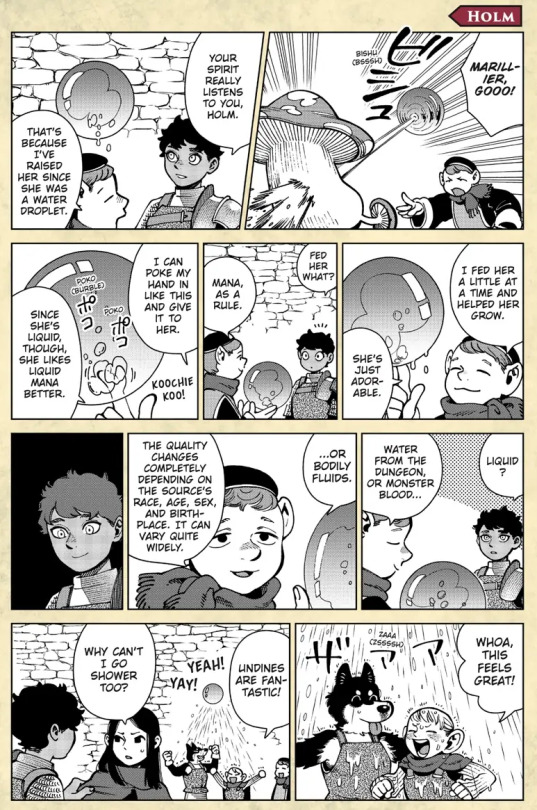
Dungeon Meshi - Holm's undine, Marillier
#Dungeon Meshi#Undine#Magic System#Dunmeshi extra#Adventurers Bible#Holm Kranom#Holm#Holm dungeon meshi#Kabrus party#Kabru#Familiar#Marillier
5K notes
·
View notes
Text
Lateral vs Vertical Magic Systems
I… think I’m the only one to use these terms? What I mean by this is different than hard and soft magic, slightly.
Quick recap:
Hard magic systems have rules and strict definition for what can and can’t be done
Soft magic systems go more off vibes, magic exists but the exact mechanics are not important or don’t exist
—
I think you can have a lateral or vertical magic system that’s either hard or soft, and what I mean by this is:
Vertical magic is where everyone has magic of wildly different flavors but hones them all for the same specific purpose.
Lateral magic is where everyone has magic of the same flavor but uses it for wildly different purposes.
Here’s some vertical magic examples:
Percy Jackson: Nobody uses their demigod powers for anything other than staying alive, by and large, and there’s a huge variety of demigod power possibilities and very little overlap. Whether it’s physical combat or mental, these kids’ powers exist so they can fight gods and monsters.
Naruto: I have not seen most of this show so correct me if I’m wrong but, this is a world where ninjitsu is almost exclusively for combat. While there’s core principles, the heaviest hitters in the show all have wild and exclusive powers or special moves that only they can use that go far beyond skill in martial arts (except for Rock Lee).
X-Men: By nature of it being a comic book, the premise of the world is built in heroes versus villains and how they use their powers to beat the snot out of each other. In X-men specifically, mutants are persecuted and can’t use their powers legally, and have little choice beyond using their mutation to stay alive and “do good”.
Lateral magic systems might be something like:
Tinker Bell: You’re a nature fairy, by and large, and everyone gets their power from the same source, pixie dust, each using their flavor of magic to suit their niche purpose in the environment
Danny Phantom: Yes, he’s a superhero and must have fights, but all of Danny’s super-powered rogues are ghosts, with no exceptions, and everyone is limited to how creatively and uniquely they use the same basic ghost principles of possession, telekinesis, invisibility, and intangibility, + their special trait, but all also suffer the same issue that unites them more than once: They are dead, and good or bad, the living fear them.
Fullmetal Alchemist: Alchemy isn’t limitless, and its practitioners typically focus on one very specific kind of alchemy of their choice with the hard rule that everyone must follow of construct, deconstruct, and reconstruct, and get really, really good at honing it mostly for combat, but also in fields of science, engineering, etc. There is alchemy and only alchemy, and it has rules.
—
Last Airbender is both! Its bending rules are strictly limited to the four elements and how creative you can get with your element… but it is also a show that heavily features martial arts and how that bending can be used in combat, but it also built a world where bending factors into other jobs, arts, and the very fabric of society.
Why does lateral vs vertical magic matter?
When you’re designing your magic system, you have to think about how this magic would integrate into a world as if its always existed there. Is it hidden magic, like in most urban fantasy? Or is it baked into the fabric of society, like with bending? Does everyone start with the same basic tools and go wild, or does everyone start wild, and all chase the same aspirations?
Whichever you pick does depend on the story you’re telling. A lot of the media I mentioned is action-adventure, which means that all magic, lateral, vertical, soft, or hard, leans toward one thing in the end: Combat.
But beyond combat, how can your magic be used? Are people allowed to practice it without regulations or is it heavily structured by their fantasy society? If it has always existed, how would their would be fundamentally different than ours?
#writing#writeblr#writing a book#writing advice#writing resources#writing tools#writing tips#fantasy#magic system
407 notes
·
View notes
Text
One of the things I love about Gravity Falls is that unlike so many shows, it doesn't try to wimp out of magic by saying "actually there's a scientific explanation for everything, no matter how far-fetched."
Gravity Falls says "okay sure there IS a scientific explanation for some things, but magic is also very definitely real and WILL fuck you up"
659 notes
·
View notes